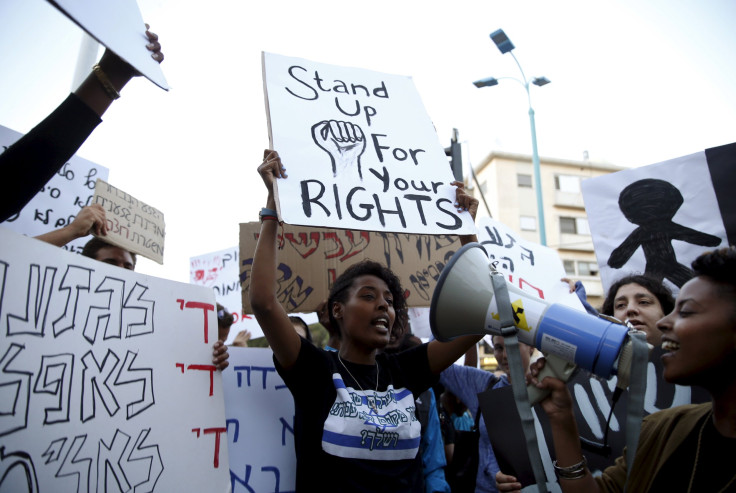Ethiopians Protest Israel Discrimination 2015: Demonstrators Gather In Tel Aviv Against Racism

Members of Israel’s Ethiopian community planned to take to the streets of Tel Aviv Monday to protest years of racial discrimination in the country. Thousands were expected to participate in the peaceful protest against what Ethiopians consider years of institutionalized racism, Israeli newspaper Haaretz reported.
“Nothing has been done for 30 years and we want to show the prime minister that this time we are not giving in," Inbar Bugale, one of the leaders of the demonstration, told Haaretz. "Even if he commits to doing something, we won’t be quiet until we see results.” Protests would be peaceful, organizers said.
In late April, a video surfaced that showed two Israel policemen beating a young Israeli soldier of Ethiopian descent in an attack that appeared unprovoked. The video sparked protests in early May against police brutality towards Ethiopian Israelis. The demonstrations grew violent, and dozens were wounded as police used tear gas and stun grenades on demonstrators, who pitched rocks and glass and plastic bottles at them in return.
At the time, Israeli Police Commissioner Yohanan Danino told Haaretz that the demonstration “was not a legitimate protest in a democratic state” and that the Ethiopian Israelis’ grievances were more about assimilation-related issues than problems with the police. But some Ethiopians in the country argue otherwise.
“There are hundreds of young Ethiopians the police open case files against for no reason, and that ruins their lives,” Misganaw Fanta, a member of the Ethiopian community in Israeli who took part in the protests in early May, told Haaretz then. “They’re good guys who want to get ahead, to study, to contribute to the state, but they can’t be combat soldiers, they don’t study, they’re called criminals.”
After the video of the beating came to light, Israeli Prime Minister Benjamin Netanyahu called for a ministerial committee to be established that would address a variety of issues, ranging from education to employment, facing Israel’s Ethiopian community.
Ethiopian Jews began immigrating in the mid-1980s, when secret flights airlifted more than 30,000 of them to Israel. Today, about 125,000 people of Ethiopian descent live in Israel, with about 81,000 born outside the country and about 38,500 within, IRIN News has reported. The conditions in which they live are vastly different from those of many others in the country. More than half live below the poverty line, as opposed to 16 percent of the general population, and rates of unemployment are significantly higher.
© Copyright IBTimes 2025. All rights reserved.






















